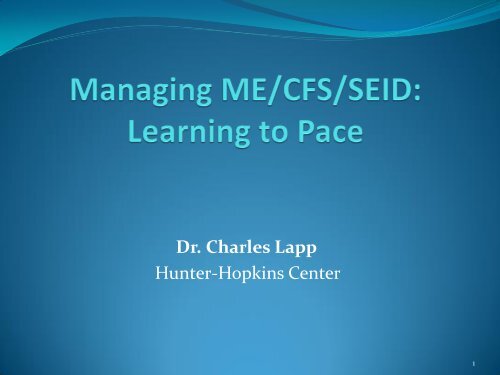Dr Charles Lapp Hunter-Hopkins Center
Lapp_CDC_Slides
Lapp_CDC_Slides
Create successful ePaper yourself
Turn your PDF publications into a flip-book with our unique Google optimized e-Paper software.
<strong>Dr</strong>. <strong>Charles</strong> <strong>Lapp</strong><br />
<strong>Hunter</strong>-<strong>Hopkins</strong> <strong>Center</strong><br />
1
Finding a balance…<br />
• Too much exertion triggers illness or relapse<br />
• Lying around causes stiffness, soreness, and<br />
deconditioning<br />
GOAL: Stay active but not too active!
Lack of activity leads<br />
to deconditioning…<br />
•Weakness / stiffness and soreness in muscles and joints<br />
•Elevated heart rate / heart racing with minimal activity<br />
•Postural hypotension / dizziness or faintness on sitting up<br />
or standing
Exercise Testing<br />
• “Brick wall” occurs at<br />
Anaerobic Threshold<br />
• AT frequently occurs<br />
within 3-5 minutes of<br />
exertion
Rest Before the Onset of Symptoms<br />
Symptoms<br />
(before the Danger Zone)<br />
Time<br />
Danger Zone
Pedometer<br />
• Establish your average<br />
steps per day<br />
• Try not to exceed this<br />
more than 500 steps<br />
• Aim for at least 1000<br />
steps per day …<br />
• But less than 5000 steps<br />
per day, typically
Three Ways to Limit Activity<br />
• Interval activity<br />
• Stop before you reach your “danger zone”<br />
• Avoid exceeding your weekly average of steps-perday
Objections<br />
“I felt good, so I decided to catch up on what I couldn’t accomplish the day before.”<br />
Over time it takes less and less to overexert and longer to recover.<br />
“I push until I feel symptoms.”<br />
By the time you feel symptoms you are already in “the danger zone” and risk a flare or<br />
relapse.<br />
“Mornings are good for me, so I do all my tasks in the morning and rest all afternoon.”<br />
But wearing yourself out in the morning just perpetuates the push-crash cycle.<br />
“I would never get anything accomplished using brief intervals and then resting all the<br />
time!”<br />
PWCs who practice interval activity get more done!<br />
“Sometimes I just have to push myself beyond limits, even though I pay a price for it.”<br />
Why would you sacrifice your health and wellbeing just to get something<br />
done?
Managing CFS/ME/SEID:<br />
Learning to Pace<br />
• Bruce Campbell, PhD<br />
• Founder, CFIDS & FM Self-Help Program<br />
• www.cfidsselfhelp.org and www.TreatCFSFM.org<br />
• <strong>Dr</strong>s. <strong>Charles</strong> <strong>Lapp</strong> and Laura Black<br />
• <strong>Hunter</strong>-<strong>Hopkins</strong> <strong>Center</strong> for CFS/ME, FM, and related<br />
conditions, Charlotte, North Carolina www.drlapp.com


